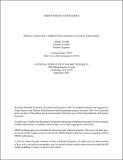Prices and Supply Disruptions during Natural Disasters
Author(s)
Cavallo, Eduardo; Rigobon, Roberto; Cavallo, Alberto F.
DownloadCavallo_Prices and supply.pdf (486.8Kb)
OPEN_ACCESS_POLICY
Open Access Policy
Creative Commons Attribution-Noncommercial-Share Alike
Terms of use
Metadata
Show full item recordAbstract
We study the daily behavior of supermarket prices and product availability following two recent natural disasters: the 2010 earthquake in Chile and the 2011 earthquake in Japan. In both cases there was an immediate and persistent effect on product availability. The number of goods available for sale fell 32 percent in Chile and 17 percent in Japan from the day of the disaster to its lowest point, which occurred 61 and 18 days after the earthquakes, respectively. Product availability recovered slowly, and a significant share of goods remained out of stock after six months. By contrast, prices were relatively stable and did not increase for months after the earthquakes, even for goods that were experiencing severe stockouts. These trends are present at all levels of aggregation, but appear strongly in non-perishable goods and emergency products. Our findings shed light into the determinants of sticky prices in conditions where traditional adjustment costs are less important. In particular, we look at the frequency and magnitudes of price changes in both countries and find that the results in Chile are consistent with pricing models where retailers have fear of “customer anger”. In Japan, by contrast, the evidence suggests a bigger role for supply disruptions that restricted the ability of retailers to re-stock goods after the earthquake.
Date issued
2014-08Department
Sloan School of ManagementJournal
Review of Income and Wealth
Publisher
Wiley Blackwell
Citation
Cavallo, Alberto, Eduardo Cavallo, and Roberto Rigobon. “Prices and Supply Disruptions during Natural Disasters.” Review of Income and Wealth 60 (November 2014): S449–71.
Version: Author's final manuscript
ISSN
00346586
1475-4991